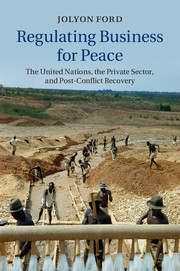Description
Regulating Business for Peace
The United Nations, the Private Sector, and Post-Conflict Recovery
Author: Ford Jolyon
The first book to study how peace operations have engaged with business to influence its peace-building impact in fragile and conflict-affected societies.
Language: English
Subject for Regulating Business for Peace:
Approximative price 103.03 €
In Print (Delivery period: 14 days).
Add to cart
Publication date: 02-2015
442 p. · 15.2x22.9 cm · Hardback
442 p. · 15.2x22.9 cm · Hardback
Description
/li>Contents
/li>Biography
/li>
This book addresses gaps in thinking and practice on how the private sector can both help and hinder the process of building peace after armed conflict. It argues that weak governance in fragile and conflict-affected societies creates a need for international authorities to regulate the social impact of business activity in these places as a special interim duty. Policymaking should seek appropriate opportunities to engage with business while harnessing its positive contributions to sustainable peace. However, scholars have not offered frameworks for what is considered 'appropriate' engagement or properly theorised techniques for how best to influence responsible business conduct. United Nations peace operations are peak symbols of international regulatory responsibilities in conflict settings, and debate continues to grow around the private sector's role in development generally. This book is the first to study how peace operations have engaged with business to influence its peace-building impact.
Part I. Policy: 1. Business and peace: describing the gap; Part II. Practice: 2. The gap in peace operation mandates, strategies and practice; 3. Timor-Leste (East Timor); 4. Liberia; Part III. Theory: 5. A theory of transitional business regulation; 6. The policy basis for a transitional regulatory role; Part IV. Future: 7. Incipient practice by peace operations; 8. Implementing transitional business regulation.
Dr Jolyon Ford is an associate of the Global Economic Governance Program at the University of Oxford. His research focuses on the regulation of investor and business activity in fragile, transitional and conflict-affected states, policy and regulatory options for fostering responsible and conflict-sensitive business practices, and wider public policy on the private sector's role in meeting development goals. He blogs on these issues in 'Private Sector – Public World'.
© 2024 LAVOISIER S.A.S.



